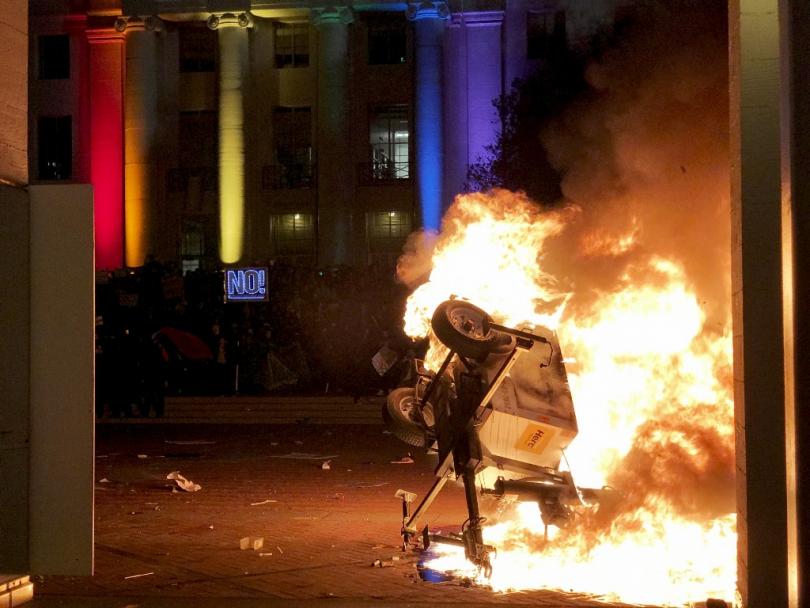Any argument defending the right to free speech will usually contain the quote often attributed to Voltaire but actually coined by English biographer Evelyn Beatrice Hall: “I disagree with what you say, but I will defend to the death your right to say it.” These famous words, and the sentiment they espouse, have played a substantial role in shaping the liberal democracies we live in today. They have endured devastating wars, deplorable leaders and should be held as a bastion of Western values.
Sadly, the idea that free speech is the essential cornerstone of our democracies is now under threat – not just by an orange-faced demagogue in the White House, but it is also an agenda being promoted by younger generations, particularly college students.
Wednesday’s violent protests at UC Berkeley are yet another example of students attempting to silence dissenting opinions. The protest was held as an attempt to stop controversial right wing commentator Milo Yiannopoulos speaking on campus to the political group, Berkeley College Republicans. Although the actual violence looks like it was carried out by a small group, potentially from outside the university, a multitude of requests to ban Yiannopoulos from speaking at the college from students (and staff) highlights the lengths well-educated people will go to prevent hearing opinions they disagree with.
By censoring him, you are only playing to his advantage and giving him ammunition to refer to younger generations as infantile “snowflakes”, too afraid to deal with views that go against their own
Reports from UC Berkeley’s student newspaper, the Daily Californian, outlines that “a group of about 150 violent agitators interrupted an otherwise peaceful protest of more than 1500 people”. Smoke bombs and fireworks were thrown, “large fires” were lit and several windows in the Martin Luther King Jr Student Union building were smashed. The talk was cancelled and Yiannopoulos had to be evacuated from the premises. This is a new low.
Yiannopoulos is an editor at Breitbart News – the ultra-conservative news outlet that backed Donald Trump in the 2016 Presidential Elections – and a professional provocateur. He is best known for criticising the feminist movement: denying the existence of rape culture and the gender pay gap and has previously boasted about Breitbart articles such as “Would you rather your child had feminism or cancer?”.
Yes, his views are deplorable, but they don’t incite violence amongst his followers – which is where the line should be drawn when it comes to free speech. He criticises feminists, he doesn’t tell his followers to beat them up. Last year, he spoke to University College Dublin (UCD)’s Economics and Philosophy societies and is a regular pundit on American and British news channels.
In a free and open society, he should be allowed to express these views regardless of whether or not some college students might be offended by them. By censoring him, you are only playing to his advantage and giving him ammunition to refer to younger generations as infantile “snowflakes”, too afraid to deal with views that go against their own. UC Berkeley was once a promoter of free speech and central to the Free Speech Movement in the 1960s. Wednesday’s protests, however, show that times have changed. This opposition to free speech is what Orwell would call “intellectual cowardice”.
As a generation that doesn’t hold free speech in a particularly high regard – according to polls – we must learn that dealing with opinions that are uncomfortable and go against our own is part of growing up and we don’t have a right not to be offended
“No platforming” is not just a phenomenon sweeping US campuses but is also becoming commonplace on this side of the Atlantic. The National Union of Students (NUS) in Britain has the support of 63 per cent of university students for its “no platforming” policy, according to a recent survey. People such as feminist intellectual Germaine Greer and LGBT activist Peter Tatchell have been subject to such a policy for being accused of holding “transphobic” views, while anti-racism campaigner Nick Lowles received similar treatment after a request for him to speak at Canterbury Christ Church University was opposed on the grounds that he holds “Islamophobic” views.
The very idea that a national students’ union even has a “no platform list” is a disgraceful affront to free speech. Those promoting such an agenda will most likely classify themselves as “progressives”, when a more appropriate term would be “regressives”. Although these curtailments to free speech are often out of concern for victims of discrimination, they make universities a more narrow-minded and less intellectual place where uncomfortable ideas cannot be discussed.
If Milo Yiannopoulos was to come to Trinity next week, I would attend – simply out of interest. A man who has dropped out of university twice and spouts non-factual statements should have his arguments challenged and isn’t deserving of the attention given to him in Berkeley. As a generation that doesn’t hold free speech in a particularly high regard – according to polls – we must learn that dealing with opinions that are uncomfortable and go against our own is part of growing up and we don’t have a right not to be offended. If we don’t, the world our generation will shape will become a more insular and ignorant place.







